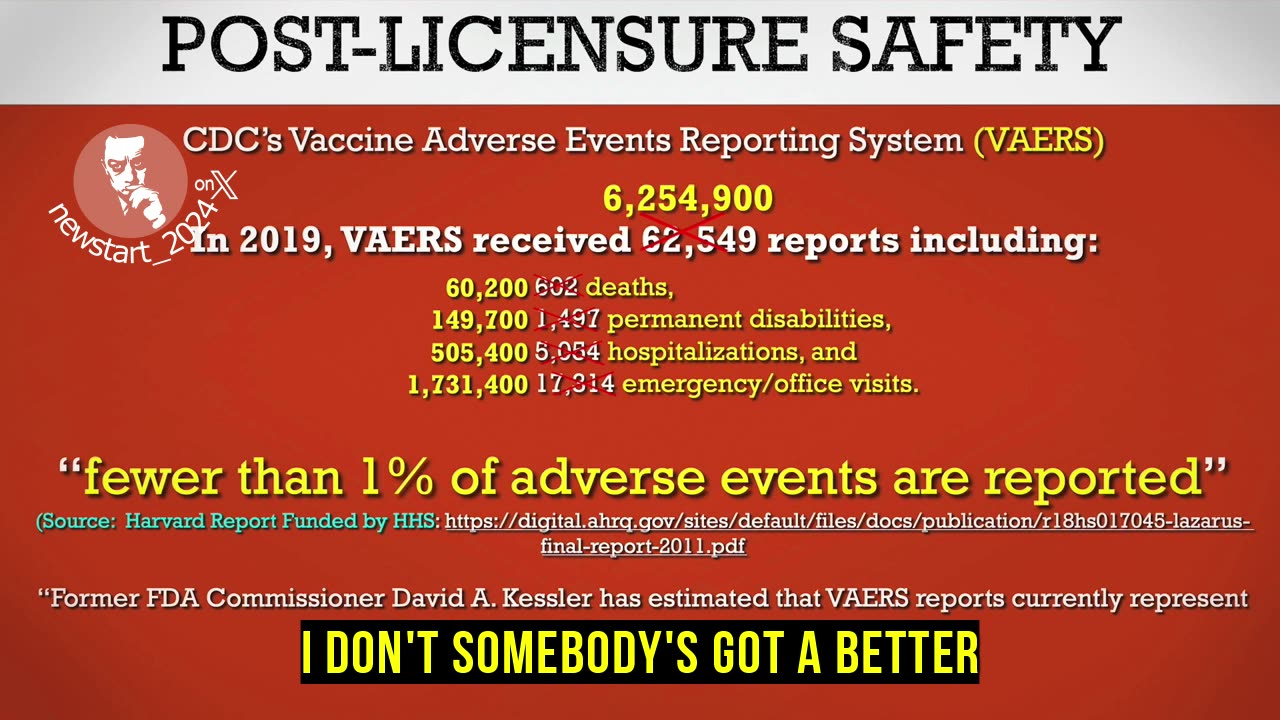Premium Only Content

Aaron Siri: Vaccinated kids at 30 times the rate of rhinitis is unvaccinated
"University of Jackson department of epidemiology did a study small based on surveys, retrospective...it showed that vaccinated kids at 30 times the rate of rhinitis is unvaccinated, 3.9 times the rate of allergy, ADHD four times, autism, asthma, learning disability, neurodevelopmental disorder. So this is actually one of the only few Vax versus un-Vax studies I'm aware of, and the findings on it are startling. And if the health department can certainly take shots, I mean, you can take shots at any epidemiological, so you can say, well, you know, it's based on parental recall, it's based on surveys, is your health, you know, how random is your sampling? Sure, you could do that, but you could take shots at it, but a lot of credit goes to these scientists who stick their neck out to do this study without NIH funding and knowing they're going to get green for doing it. That's incredible they actually did it, frankly. More incredible it exists in any public literature. Long story short, there's no studies that rebut this. In terms of the scope of the harm.
So we've looked at what harms might be caused by vaccines, schools of pharma companies. We've looked at the fact that they failed to study them. And we've looked at what some of the evidence that might show what the health outcomes, what the impact might be of this increasing vaccine schedule. How many people are harmed potentially? What's, you know, to get an indication of that, a signal, we could look at theirs and I'm going to 2019 pre-pandemic.
And this is the number of, of, of reports of, you know, to VAERS of serious issues, death, permanent disability, hospitalizations, emergency office visits. And I will point out that back then, this was a federal government study conducted by Harvard, it found that fewer than 1% of adverse events were reported to VAERS. I think it's probably increased since COVID because people are more aware of VAERS now. But if you, you know, this is terrible science, by the way, what I just did. Terrible science. I just say that right now. But if it's 1%, okay, so let's multiply that by 100. I'm not saying these numbers are, that's right. I'm making clear, this is terrible science. But this is kind of the best approximation I have. Somebody's got a better study, I'll take it. I'm happy to look at that data."
-
 27:09
27:09
MYLUNCHBREAK CHANNEL PAGE
12 hours agoDilmun: Where Life Never Ends
43.4K33 -
 LIVE
LIVE
Slightly Offensive
5 hours ago $18.98 earnedHas Trump FAILED US? The ABSOLUTE STATE of The Right Wing | Guest: Nick Fuentes
9,063 watching -
 LIVE
LIVE
AlaskanBallistics
1 hour agoI Love This Gun PodCast #16
146 watching -
 2:59:26
2:59:26
Twins Pod
10 hours agoEMERGENCY PODCAST WITH ANDREW TATE! - Twins Pod - Special Episode - Andrew Tate
116K99 -
 2:52:01
2:52:01
Jewels Jones Live ®
2 days agoTRUMP SECURES BORDER | A Political Rendezvous - Ep. 113
55.1K26 -
 25:02
25:02
marcushouse
22 hours ago $38.44 earnedStarship Just Exploded 💥 What Went Wrong This Time?!
129K63 -
 12:00
12:00
Silver Dragons
1 day agoBullion Dealer Reveals Best Silver to Buy With $1,000
78K9 -
 12:58
12:58
NinjaGamblers
13 hours ago $13.71 earnedIs This The BEST Way to Win At Roulette? 😲
122K13 -
 1:01:54
1:01:54
CharLee Simons Presents Do Not Talk
2 days agoCALIFORNIA'S DONE!
81.6K35 -
 7:33
7:33
MudandMunitions
1 day agoUnboxing My FIRST Revolver! Smith & Wesson 442 .38 Special and What’s Coming Next for the Channel
112K15